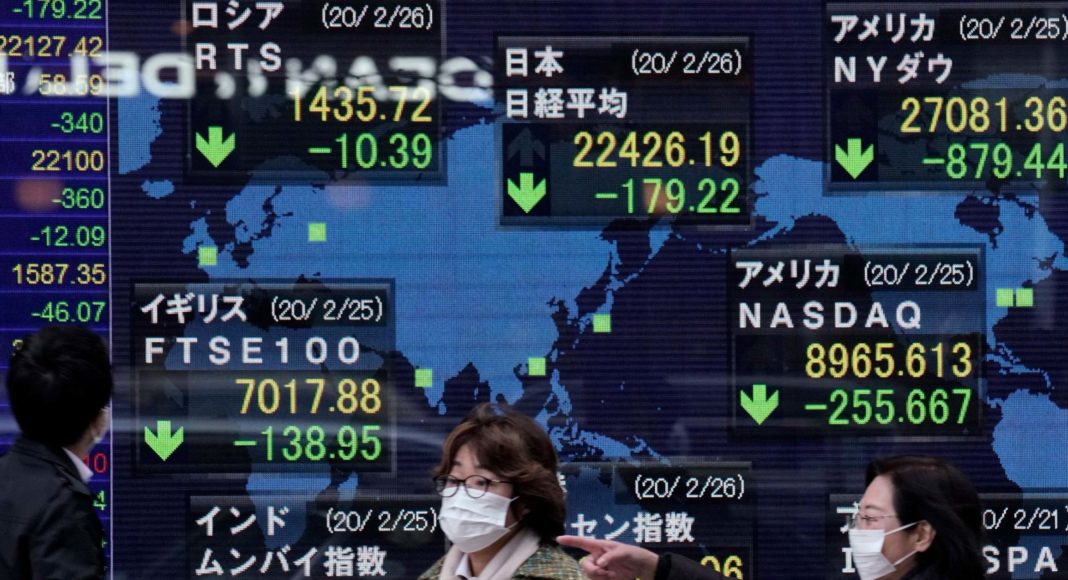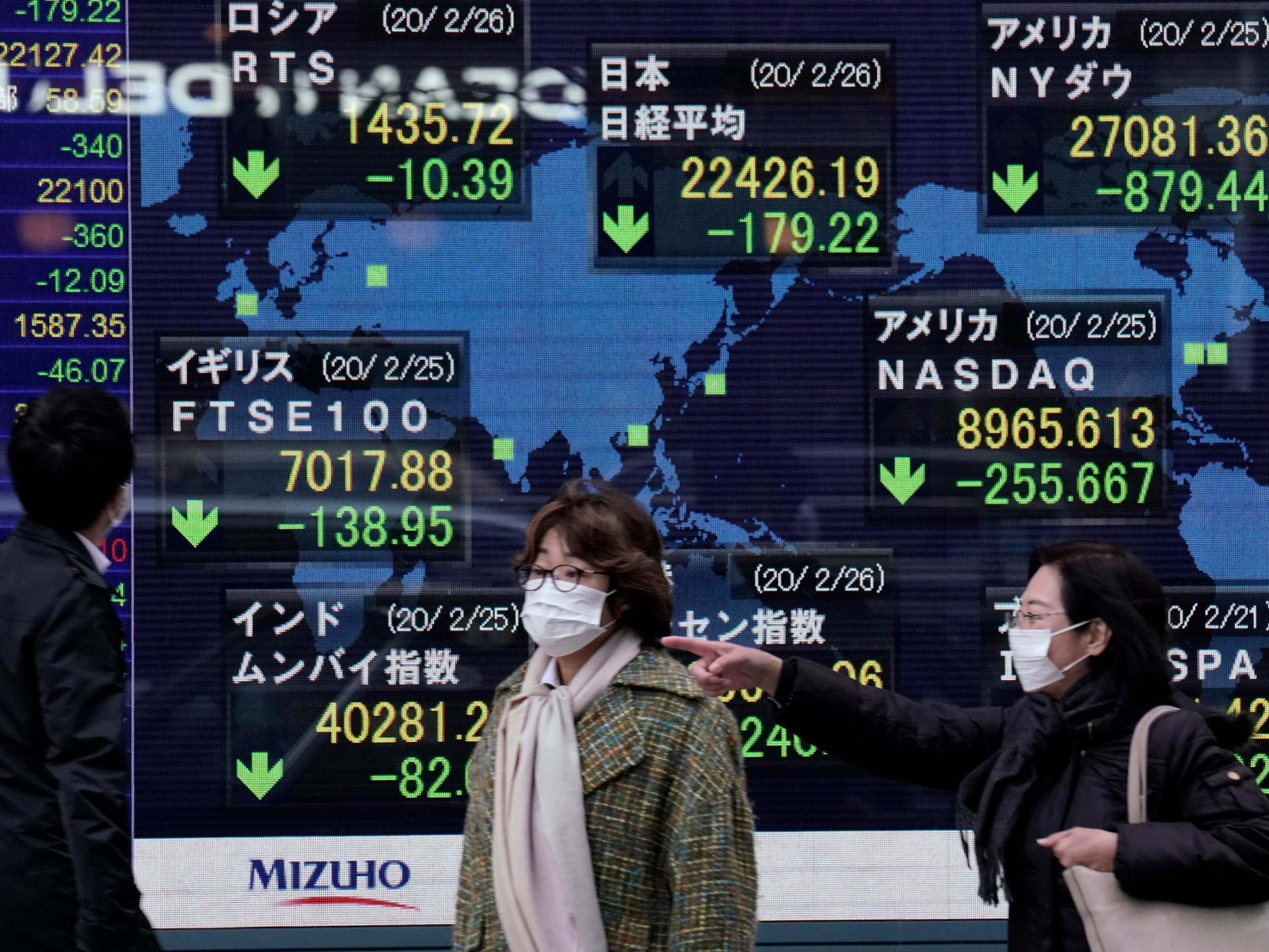Financial markets have, suddenly, panicked about the spread of the coronavirus from China and the prospect of a disease pandemic.
The share prices of listed companies around the world have been tumbling since the beginning of the week.
It’s estimated that some $3 trillion (£2.3 trillion) has been wiped off the value of firms over the past four days.
Download the new Independent Premium app
Sharing the full story, not just the headlines
Download now
Watch more
Markets are on the verge on what’s known as a “correction” – where they slip more than 10 per cent from their recent peaks.
So why is this happening? What exactly do traders fear will happen if Co-19 does become a pandemic?
And why is this sell-off only happening now given the media has been full of headlines about the spread of coronavirus for weeks?
Which stock markets have fallen the most?
The UK’s FTSE 100 Index, which is dominated by multinational companies which earn revenues all over the world, is down more than 6 per cent this week.
Across Europe the largest companies’ stocks were around 9 per cent lower on Wednesday over the last four trading sessions.
Stocks have been falling all week in China, Korea, Japan and Hong Kong.
The big US exchanges – the S&P500 and the Dow Jones Index – have also slumped by more than 5 per cent in recent days.
Reuters Eikon
Meanwhile traditional safe haven assets like US government bonds and gold have risen in value.
No hype, just the advice and analysis you need
The international oil price is down too, falling below $50 a barrel, the lowest in a year.
Why are traders selling stocks?
Essentially because they think the economic impact of the virus is likely to be much more severe than they previously believed
China, the world’s second largest economy, was due to account for around a third of global GDP growth in 2020.
left
Created with Sketch.
right
Created with Sketch.
1/10
A man wearing a face mask crosses a road in Wuhan, the epicentre of the novel coronavirus outbreak.
Reuters
2/10
A view of the empty entrance to the Università Cattolica (Catholic University) in Milan, northern Italy, on 24 February, 2020.
EPA
3/10
Empty streets in Daegu, South Korea, on 23 February, 2020.
EPA
4/10
Empty streets in Daegu, South Korea, on 23 February 2020.
EPA
5/10
A lone sanitation worker sits near the closed Hankou Railway Station in Wuhan, Hubei province, China, on February 24, 2020.
Reuters
6/10
A view of a deserted street in Codogno, northern Italy, on February 23, 2020.
EPA
7/10
Italian police officers set a road block in Codogno, Northern Italy, on Monday, Feb. 24, 2020.
AP
8/10
A supermarket closed in Codogno, one the northern Italian towns placed under lockdown, on February 23, 2020.
EPA
9/10
A lone cyclist wearing sanitary masks pedals in the center of Codogno, Northern Italy.
LaPresse via AP
10/10
An empty road at the entrance of the small Italian town of Codogno on February 23, 2020.
AFP via Getty
1/10
A man wearing a face mask crosses a road in Wuhan, the epicentre of the novel coronavirus outbreak.
Reuters
2/10
A view of the empty entrance to the Università Cattolica (Catholic University) in Milan, northern Italy, on 24 February, 2020.
EPA
3/10
Empty streets in Daegu, South Korea, on 23 February, 2020.
EPA
4/10
Empty streets in Daegu, South Korea, on 23 February 2020.
EPA
5/10
A lone sanitation worker sits near the closed Hankou Railway Station in Wuhan, Hubei province, China, on February 24, 2020.
Reuters
6/10
A view of a deserted street in Codogno, northern Italy, on February 23, 2020.
EPA
7/10
Italian police officers set a road block in Codogno, Northern Italy, on Monday, Feb. 24, 2020.
AP
8/10
A supermarket closed in Codogno, one the northern Italian towns placed under lockdown, on February 23, 2020.
EPA
9/10
A lone cyclist wearing sanitary masks pedals in the center of Codogno, Northern Italy.
LaPresse via AP
10/10
An empty road at the entrance of the small Italian town of Codogno on February 23, 2020.
AFP via Getty
With many analysts predicting that the disruption to China’s economy will slash its growth rate (previously around 6 per cent) by at least 1 percentage point, global growth and indirectly, global corporate revenues and profits, will automatically be impacted.
Slower global growth will also likely crimp global demand for oil.
There’s also a specific issue with China being a vital link in many companies’ cross-border supply chains, particularly those of technology firms.
Then there’s travel. If people are going to be crossing borders less because of fears of the virus, it makes sense to expect airlines and travel companies to suffer.
Technology firms, airlines and energy companies have indeed been among the major market casualties this week.
But why is it only happening now?
Financial markets are supposed to be forward looking, so it does seem rather strange that they should have only responded to the economic dangers of the virus so late in the day.
What triggered this week’s sell-off were reports that Italy had suffered a virus outbreak and that the government had put quarantine measures on almost a dozen towns in the industrial north of the country.
This seemed to signal to traders that the virus really was now becoming a problem outside China – and that it would have a direct economic impact in Europe.
The potential for Europe’s check-free travel system (known as Schengen) to spread the virus more rapidly also, some say, contributed to a spike of concern.
“Clearly in Schengen areas it becomes harder to isolate whole regions and countries” says Simon French of the stock broker Panmure Gordon.
Is that really the extent of the explanation?
Many analysts say complacency is the fundamental reason for the late market reaction.
Nouriel Roubini, of the Stern School of Business, says many traders “deluded” themselves that the epidemic would be limited to China, and that while that country’s growth would suffer early in the year it would bounce back rapidly.
He also argues markets placed too much faith in the ability of policymakers around the world to clear up the damage by cutting interest rates or increasing public spending.
Mr Roubini, sometimes known as “Dr Doom” for his pessimistic outlook, also argues, in a Financial Times article, that traders have still not grasped the scale of the problem.
“Despite this week’s big sell-off in equity markets, the worst is yet to come,” he says.




